'We are not Russian spies' - Irish politicians declare
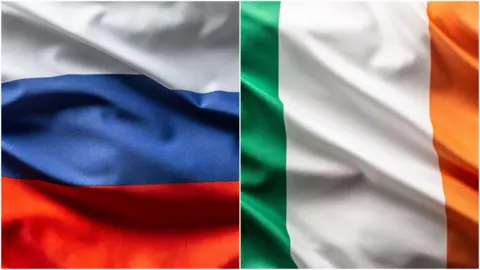 Getty
GettySome Irish senators have declared they are “not spies” amid reports of Russian interference in Ireland.
A report from The Sunday Times last week alleged that a member of the Oireachtas (Irish parliament) has been recruited a Russian asset.
It claimed the security services were monitoring the politician, who has allegedly met Russian handlers outside Dublin.
The so-called Russian asset is known as Cobalt and their identity has been the subject of much discussion.
On Wednesday, a number of senators, in the Seanad, (the upper house of the Oireachtas) took to their feet to declare the story did not refer to them.
'Avoid any potential stain on this house'
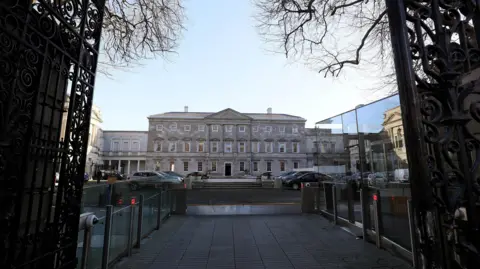 PA Media
PA MediaFianna Fáil’s Timmy Dooley first made the declaration and called on others to do the same.
“There have been some rumours circulating that members of the upper house have been involved with Russia and there may or may not be a spy in our midst,” Senator Dooley said.
“I think its important in order to avoid any potential stain on this house, that members would voluntarily make a statement that they are not the subject of any investigation or that they have never been in the clutches of Russia,” Mr Dooley added.
“And before I sit down, I can declare that I am not such person,” he said.
Cathaoirleach (Speaker) of the Seanad Jerry Buttimer reminded members in the Seanad that nobody has been named in the report but also said he was not the spy.
Fianna Fáil senator Fiona O’Loughlin took to her feet to say she too was not a spy, followed party member Malcolm Byrned and Fine Gael’s Maria Byrne.
Ireland 'not immune from Russian influence'
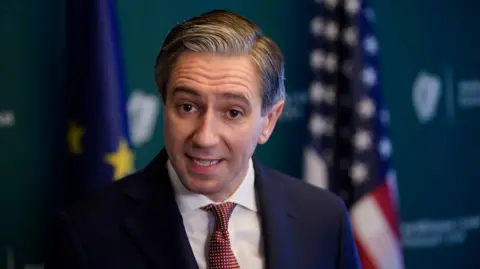 Pa
PaTaoiseach (Irish PM) Simon Harris, speaking in Washington on Wednesday, said the government was taking the allegations seriously.
"What I've been saying in relation to national security is that generally we don't comment," he added.
"We do that to keep our people safe, to keep our country safe as well. I think we need to be alert in Ireland to the fact that we're not immune from Russian influence," he said.
"Russia is a country that seeks to actively influence public debate and discourse, and I think it's also a statement of fact to say that that level of activity has increased by Russia since their brutal and evil invasion of Ukraine, and therefore the Gardaí and our security services obviously monitor these matters very closely."
He said that gardaí (Irish police) take these matters "extremely seriously".
His comments come after an expert told BBC News NI that anyone with a powerful position in Ireland could be used as a Russian asset.
'Anyone in a position of influence is vulnerable'
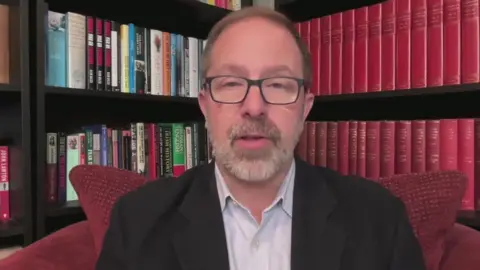
Keir Giles from the Conflict Studies Research Centre said it was not just politicians who should be aware of Russian influence.
He added that the belief among some in Ireland that Russia would not be interested in such a small nation is what makes them vulnerable.
“It's everybody that is in a position of influence,” he said, “and that includes journalists, for example, academics, and senior business people.”
“They're all targets, and they're targets for Russian intelligence in precisely the same way as they are for anybody else that wants to influence their decision-making in one way or another," he added.
Mr Giles said Russia cast its net wide in the search for agents.
"If Russia can get a live individual in the room with the right conversations, dropping the wrong information into the wrong areas at the wrong time, that's vastly more effective than 10s of 1000s of roles on social media."
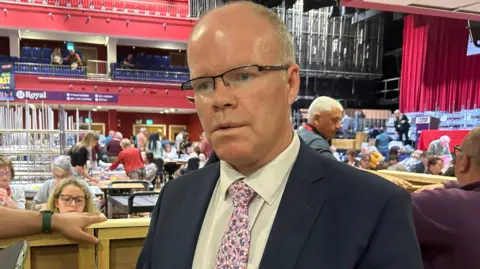 PA Media
PA MediaOne current TD said he was approached in 2017 with an offer to meet Vladimir Putin.
Peadár Toibin, the leader of Aontú, said it was when he was a front bench TD for Sinn Féin.
“I was spokesperson for Enterprise in my previous political party, I got phone calls and emails from a consultancy firm,” he said.
“The objective of those conversations were to invite me to a Economic Forum in Yalta in Crimea.
“There were 1,500 people, delegates in attendance, opportunities to influence people, high worth value individuals," he added.
He claimed he then got an email and a phone call to say that he would have access to Putin in a conversation.
"I found this quite incredible myself, to be honest. I was very concerned with the anti-democratic nature of Russia at that time.”
Mr Toibin said he declined the invitation and informed his previous party’s headquarters of the approach.
